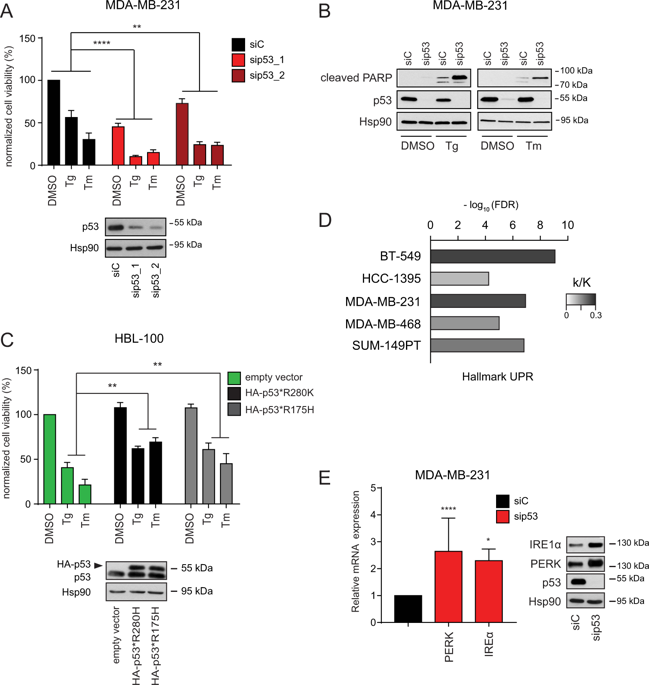Our official English website, www.x-mol.net, welcomes your
feedback! (Note: you will need to create a separate account there.)
Mutant p53 improves cancer cells' resistance to endoplasmic reticulum stress by sustaining activation of the UPR regulator ATF6.
Oncogene ( IF 6.9 ) Pub Date : 2019-07-16 , DOI: 10.1038/s41388-019-0878-3 Daria Sicari 1, 2 , Marco Fantuz 1, 2, 3 , Arianna Bellazzo 1, 2 , Elena Valentino 1, 2 , Mattia Apollonio 1, 2 , Ilaria Pontisso 1, 2 , Francesca Di Cristino 1, 2 , Marco Dal Ferro 2 , Silvio Bicciato 4 , Giannino Del Sal 1, 2, 5 , Licio Collavin 1, 2
Oncogene ( IF 6.9 ) Pub Date : 2019-07-16 , DOI: 10.1038/s41388-019-0878-3 Daria Sicari 1, 2 , Marco Fantuz 1, 2, 3 , Arianna Bellazzo 1, 2 , Elena Valentino 1, 2 , Mattia Apollonio 1, 2 , Ilaria Pontisso 1, 2 , Francesca Di Cristino 1, 2 , Marco Dal Ferro 2 , Silvio Bicciato 4 , Giannino Del Sal 1, 2, 5 , Licio Collavin 1, 2
Affiliation

|
Missense mutations in the TP53 gene are frequent in human cancers, giving rise to mutant p53 proteins that can acquire oncogenic properties. Gain of function mutant p53 proteins can enhance tumour aggressiveness by promoting cell invasion, metastasis and chemoresistance. Accumulating evidences indicate that mutant p53 proteins can also modulate cell homeostatic processes, suggesting that missense p53 mutation may increase resistance of tumour cells to intrinsic and extrinsic cancer-related stress conditions, thus offering a selective advantage. Here we provide evidence that mutant p53 proteins can modulate the Unfolded Protein Response (UPR) to increase cell survival upon Endoplasmic Reticulum (ER) stress, a condition to which cancer cells are exposed during tumour formation and progression, as well as during therapy. Mechanistically, this action of mutant p53 is due to enhanced activation of the pro-survival UPR effector ATF6, coordinated with inhibition of the pro-apoptotic UPR effectors JNK and CHOP. In a triple-negative breast cancer cell model with missense TP53 mutation, we found that ATF6 activity is necessary for viability and invasion phenotypes. Together, these findings suggest that ATF6 inhibitors might be combined with mutant p53-targeting drugs to specifically sensitise cancer cells to endogenous or chemotherapy-induced ER stress.
中文翻译:

突变p53通过维持UPR调节剂ATF6的激活来提高癌细胞对内质网应激的抵抗力。
TP53 基因的错义突变在人类癌症中很常见,从而导致突变的 p53 蛋白获得致癌特性。功能突变p53蛋白的获得可以通过促进细胞侵袭、转移和化学抗性来增强肿瘤的侵袭性。越来越多的证据表明突变的 p53 蛋白也可以调节细胞稳态过程,这表明错义 p53 突变可能会增加肿瘤细胞对内在和外在癌症相关应激条件的抵抗力,从而提供选择性优势。在这里,我们提供证据表明突变的 p53 蛋白可以调节未折叠蛋白反应 (UPR) 以增加内质网 (ER) 应激下的细胞存活率,这是癌细胞在肿瘤形成和进展以及治疗期间暴露的条件。机械地,突变 p53 的这种作用是由于促生存 UPR 效应子 ATF6 的激活增强,与促凋亡 UPR 效应子 JNK 和 CHOP 的抑制相协调。在具有错义 TP53 突变的三阴性乳腺癌细胞模型中,我们发现 ATF6 活性是生存能力和侵袭表型所必需的。总之,这些发现表明 ATF6 抑制剂可能与突变的 p53 靶向药物联合使用,以使癌细胞对内源性或化疗诱导的 ER 应激特异性敏感。
更新日期:2019-07-17
中文翻译:

突变p53通过维持UPR调节剂ATF6的激活来提高癌细胞对内质网应激的抵抗力。
TP53 基因的错义突变在人类癌症中很常见,从而导致突变的 p53 蛋白获得致癌特性。功能突变p53蛋白的获得可以通过促进细胞侵袭、转移和化学抗性来增强肿瘤的侵袭性。越来越多的证据表明突变的 p53 蛋白也可以调节细胞稳态过程,这表明错义 p53 突变可能会增加肿瘤细胞对内在和外在癌症相关应激条件的抵抗力,从而提供选择性优势。在这里,我们提供证据表明突变的 p53 蛋白可以调节未折叠蛋白反应 (UPR) 以增加内质网 (ER) 应激下的细胞存活率,这是癌细胞在肿瘤形成和进展以及治疗期间暴露的条件。机械地,突变 p53 的这种作用是由于促生存 UPR 效应子 ATF6 的激活增强,与促凋亡 UPR 效应子 JNK 和 CHOP 的抑制相协调。在具有错义 TP53 突变的三阴性乳腺癌细胞模型中,我们发现 ATF6 活性是生存能力和侵袭表型所必需的。总之,这些发现表明 ATF6 抑制剂可能与突变的 p53 靶向药物联合使用,以使癌细胞对内源性或化疗诱导的 ER 应激特异性敏感。















































 京公网安备 11010802027423号
京公网安备 11010802027423号